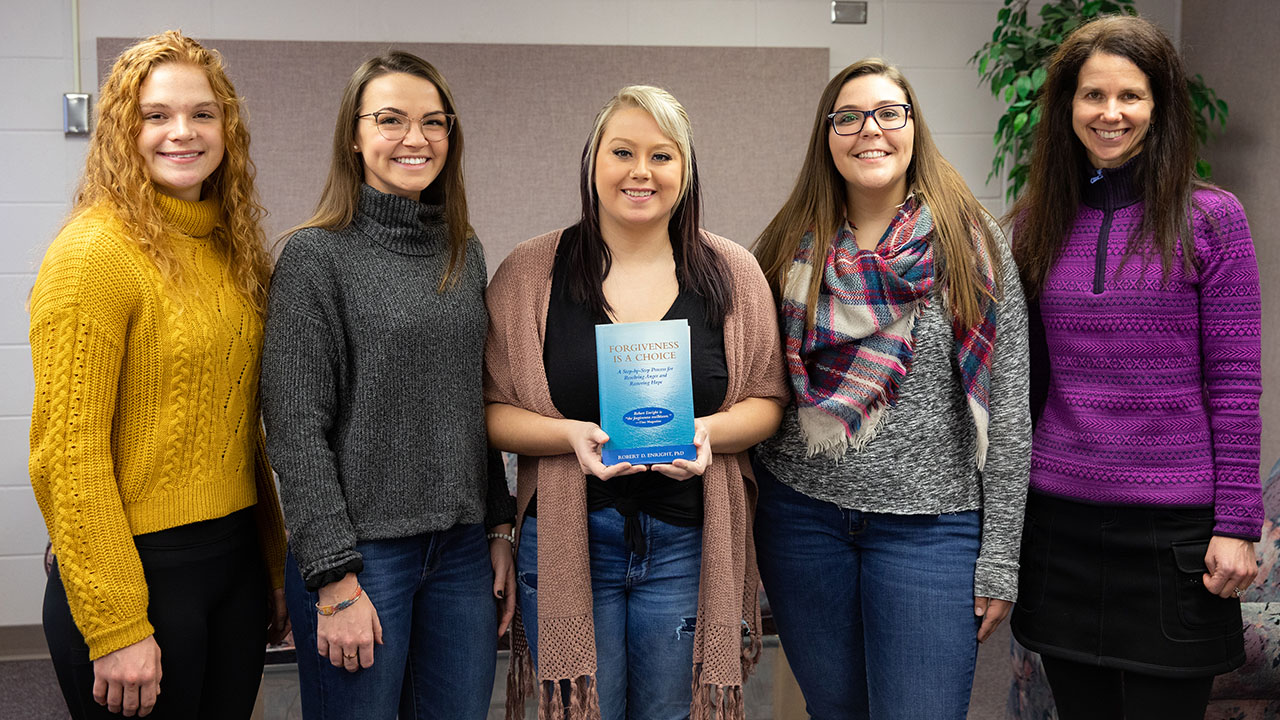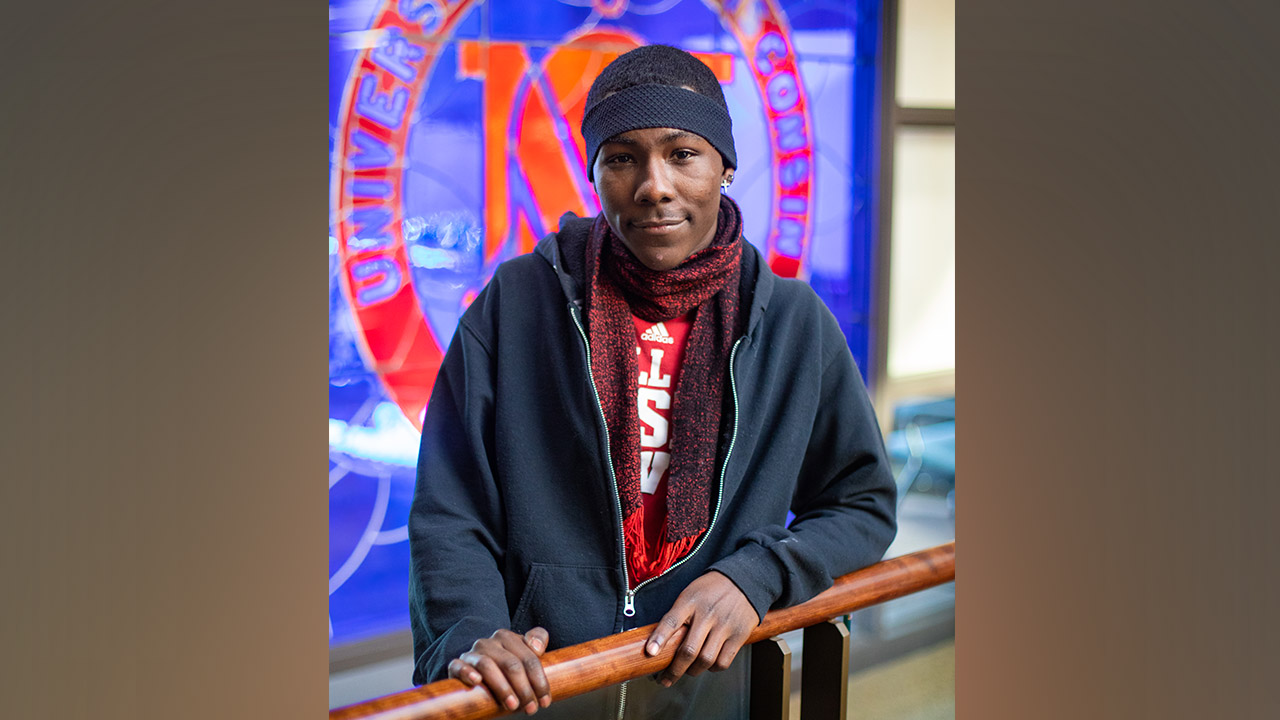

“The most important thing I learned from this experience was to remember that prisoners are human beings. They just want to be heard, like any other human being. They needed to talk and bring their issues to the surface. Regardless of the mistakes they made to end up incarcerated, they still deserve a listening ear and compassion. This experience changed my view on inmates, forgiveness and life.”
– MacKenzy Slaght, senior psychology major at UW-Platteville from Prairie du Chien, Wisconsin
This fall, three University of Wisconsin-Platteville psychology students led a 12-week forgiveness discussion group for inmates at the Prairie du Chien Correctional Institution, a medium security state prison in Prairie du Chien, Wisconsin. The group met for two hours each Monday evening throughout the semester.
The collaborative internship experience, conducted at PDCI each semester and summer since September 2018, enables students majoring in psychology to gain critical hands-on experience in their fields and in restorative justice, a theory of justice that emphasizes repairing the harm caused by criminal behavior. The students’ goal is to provide inmates with an opportunity for personal growth and development in a safe and informally-structured environment.
Student interns included MacKenzy Slaght, a senior psychology major with a minor in criminal justice and Spanish from Prairie du Chien, Wisconsin; Jordan Wages, a junior psychology major with a minor in criminology from Chicago, Illinois; and Haley Meunier, a junior psychology major with a minor in criminal justice from Abrams, Wisconsin. Students were advised by Dr. Elizabeth Gates, chair of the Department of Psychology at UW-Platteville, and Dr. Theron Parsons, professor of psychology at UW-Platteville.
“This internship provides invaluable experience for students as they gain knowledge of the complex situations that lead to incarceration and how inmates are able to make peace with conflicted relationships from their past and present,” said Gates.
Each week, the 7-10 inmates participating in the forgiveness program read one chapter from the book “Forgiveness is a Choice: A step-by-step process for resolving anger and restoring Hope” by Dr. Robert Enright, founder of the International Forgiveness Institute, and completed a journaling exercise. The interns then facilitated a group discussion about the topics covered in the chapter the inmates had read, ensuring that they avoided tangents and discussions of serious trauma and abided by the agreed-upon rules.
“Dr. Enright’s book is an excellent resource,” said Lisa Pettera, program supervisor at PDCI, who oversees the forgiveness program. “Allowing inmates an opportunity to read the book slowly, journal about it and discuss it among themselves fosters personal development. The discussions are always remarkably in-depth and insightful.”
Development of forgiveness program
Pettera said the forgiveness program was initially developed because the topic of forgiveness came up regularly when inmates participated in restorative justice programming led by UW-Platteville students. “Forgiveness is not a simple topic,” she said. “During our restorative justice programming, inmates are often very interested in how to earn forgiveness for what they’ve done, but many are still angry at others who have harmed them. We would refer inmates to Dr. Enright’s book, but it wasn’t fulfilling their need. PDCI has had such great experiences with restorative justice programming led by UW-Platteville students that it seemed natural to reach out to Dr. Elizabeth Gates for additional collaboration.”
Pettera said working with inmates can be quite intimidating – hence the requirement for three students to work together – and this particular group was very diverse. The inmates who participate range in age from 20s-50s and their socio-economic backgrounds include inner-city gang members to white-collar professionals.
She noted that due to security concerns, PDCI cannot allow inmates to gather without staff or volunteer oversight, and it doesn’t have the staffing to support evening activities without volunteer leadership. “Students are a great resource for us, and facilitating groups can be a wonderful learning and leadership experience for them,” she said. “This group would not have been possible without their volunteer leadership. Their involvement is always greatly appreciated.”
Pettera and Parsons credited Rachel Cook, a senior psychology major with an emphasis in substance abuse and a minor in criminal justice at UW-Platteville, with creating the collaboration between UW-Platteville’s Department of Psychology and PDCI. Cook has since completed forgiveness groups at the Wisconsin Secure Program Facility in Boscobel. The following year, Safiya Zahid, a senior psychology and criminal justice major at UW-Platteville, and Sydney McDonald, a senior psychology major with a criminal justice minor at UW-Platteville, took the reins of the PDCI program and completed most of the groups solo, with Pettera’s approval.
“Helping facilitate the forgiveness groups at both PDCI and WSPF have been an eye-opening experience for me,” said Cook. “I was able to see the way forgiveness was changing inmates’ lives in a positive way as they went through the process of forgiving. I am beyond thankful that UW-Platteville gave me this opportunity because I learned more from the inmates in my groups than I could have ever learned sitting in a classroom.”
“The current students owe a lot of gratitude for the ‘pioneers’ of this program, who demonstrated to the staff at PDCI that UW-Platteville students have the temperament, skills and abilities to be given such incredible opportunities and responsibilities,” said Parsons, who supervised all three students in 2018-19. “Lisa Pettera and I were both trepidatious about turning the program over to students without a professional present in each session, but Rachel had established such a strong presence, and we trusted Safiya and Sydney to support each other, that we were confident of their professional boundaries. I’m especially proud of Rachel who then took the program to WSPF and built it from the ground up.”
Impact of program on students
Leading the discussion group and listening to the thoughts that inmates shared not only enabled students to gain experience working with inmates and restorative justice, it changed how they thought about inmates and the concept of forgiveness. It also helped prepare them for their future careers.
Jordan Wages
“The forgiveness program helped inmates learn how to forgive people in their lives who had hurt them,” said Wages. “As I listened to their personal stories, I wondered about their conditions and what happened to them when they were younger. It’s clear that poverty and the environment played a role.”
After he graduates from UW-Platteville, Wages plans to work in a position where he can help juveniles who are transitioning into, or out of, incarceration. “It can be very difficult for juveniles to transition back into society because the environment in jail is so different,” he said. “The internship experience at PDCI is directly applicable to this type of career.”
Haley Meunier
“I enjoyed seeing the growth within the inmates’ personalities and ways of thinking,” said Meunier. “I learned many things from this experience, but the most important was that a key part of positive change is self-awareness and that showing a little bit of compassion can go a long way. Even though I already came in with the thought that inmates are just people, by working with them it really emphasizes that they just made a mistake and they want to do better for their families and for themselves.”
After she graduates from UW-Platteville, Meunier plans to attend graduate school and earn a master’s in social work. Her career goal is to work in the restorative justice field to help both families and individuals improve their lives. “Working with these inmates gave me experience and insight into other peoples’ lives and their challenges, which will help me towards my career goal of making a positive impact on other people’s lives,” she said.
MacKenzy Slaght
“The thing I enjoyed most about this experience was working with the inmates,” said Slaght. “We had a really great group and they made this experience enjoyable. They were there because they genuinely wanted a change in their life. They did not receive anything out of this group besides the experience. This meant a lot to me. After the 12 weeks were done, it felt like we still had so much to cover and conquer. I wish we could have had more time for this group for the benefit of the men.”
After she graduates from UW-Platteville, Slaght plans to continue her education and earn a master’s in social work or counseling. “I have a compassionate heart and it needs to be used to help others,” she said. “I want to be the light for others. I want to make a difference in people’s lives. This experience showed me that I am in the right field of work. Being able to get real life experience has been one of the best preparations I have had to prepare for my future career. I am so grateful for this experience.”
Impact of program on inmates
Participating in the program had a deep impact on the inmates too, who shared what they had learned and how they planned to use the information in their daily lives.
“Forgiveness takes time and it’s okay to do it at your own pace,” said one inmate. “You don’t have to feel bad or guilty for taking some time. It’s important for your own health to forgive and let go. I appreciate everybody who took the time to participate in this with me.”
“I learned that by learning to forgive, I’m learning how to let go of my anger,” said another inmate. “I now feel very light, like walking on air. I’m also learning to forgive myself, which is helping me rebuild bonds with my kids.”
“I will use this information I learned in the group daily on most of my situations,” said a third inmate. “At times, I felt that since I’m in prison, a lot of people are mad at me, so I use some techniques to help them understand my problems and situation.”
UW-Platteville and PDCI hope to continue collaborating in creating other programming for inmates.